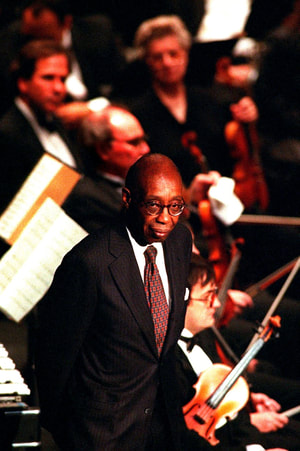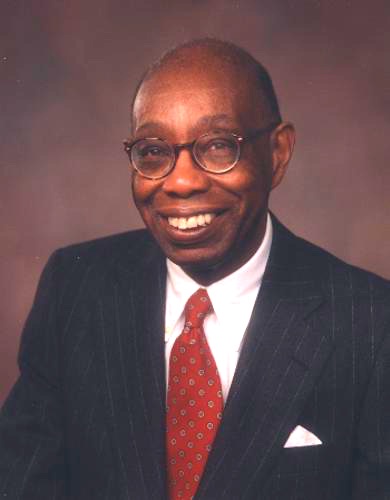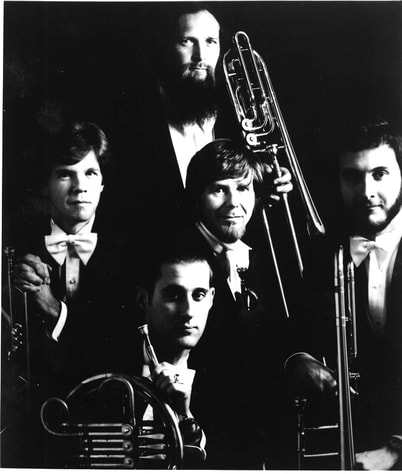These recordings are not to be downloaded
GEORGE WALKER
George Theophilus Walker was born on June 27, 1922, in Washington, D.C.
His father, also named George, was a physician, and young George was nicknamed Doc by friends on the assumption that he would follow in his footsteps. It was at the urging of his mother, Rosa King Walker, that he began piano lessons at 5. “I had no particular interest in the piano or in music,” he told the PBS series 'State of the Arts' in 2012, “but in our household, when you were told to do something, you did it.”
NY Times excerpt from Aug. 27, 2018 article by Neil Gunslinger
CLICK ON EACH PHOTO FOR LIGHTBOX
|
George Walker:
1996 Pulitzer Prize winner "is one of the greatest composers of our time." "Master composer at work." Fanfare Magazine 2017 Audiophile Auditions 2011 |
Commentary:
George Walker is the black composer you should know but don’t. Why that may change. Los Angeles Times Mark Swed 01/17/2020 |
|
George Walker began his groundbreaking career as a young piano virtuoso when after his first public recital at the age of 14 he was admitted to the Oberlin College Conservatory on a full scholarship. Graduating with the highest honors in his class, Walker was admitted to the Curtis Institute of Music and became the first black graduate of this renowned music school. His compositions demonstrate a wide spectrum of artistic excellence in genres ranging from instrumental and vocal solos and chamber music to works for orchestra and other large ensembles. To see a list of more than 100 works by George Walker Click Here. [End] |
 Photo (Luis Sinco / Los Angeles Times) Photo (Luis Sinco / Los Angeles Times)
1996: George Walker takes a bow after a California performance of his Pulitzer Prize winning Lilacs for voice and orchestra. This work, set to a text by Walt Whitman, is a moving meditation on the assassination of President Abraham Lincoln. [End]
|
George Walker, who died in 2018 at age 96, was one of America’s most distinguished composers. He won the Pulitzer Prize for music in 1996. He was a superb pianist and an esteemed academic. His shelves and walls were overloaded with the awards and honorary degrees that go with a legendary career. No history of American music is complete without Walker, and that means many a standard history of American music is incomplete. Who among even our most avid classical music lovers, let alone the general public, even knows who George Walker was, much less has heard his music? [Continued below] |
Among all else, Walker, the grandson of a slave, was the first African American classical musician to break the color barrier. Had he been a member of the Harlem Renaissance, I have no doubt he'd be widely read. Were he an Abstract Expressionist painter, you'd be in gravy if you had been savvy enough to have bought work before museums put on exhibitions.
Read More
Read More
George Walker
Music for Brass (Sacred and Profane)
1. Invokation 2. Dance I
3. Chorale 4. Dance II
1982 Performance by the
Annapolis Brass Quintet
University of California, Davis
TAP > AUDIO BAR BELOW
(There may be a 10 to 20 second delay before sound begins.)
Music for Brass (Sacred and Profane)
1. Invokation 2. Dance I
3. Chorale 4. Dance II
1982 Performance by the
Annapolis Brass Quintet
University of California, Davis
TAP > AUDIO BAR BELOW
(There may be a 10 to 20 second delay before sound begins.)
Music for Brass (Sacred and Profane) was commissioned by the Hans Kindler Foundation and premiered in 1975 by the American Brass Quintet in Washington, DC.
The four sections of the work are, Invokation, Dance I, Chorale and Dance II. The fanfare-like quality at the beginning of the Invokation is succeeded by a fugal section in which two themes are eventually combined before the reiteration of the opening section of the piece. A pervasively rhythmic verve dominates the two Dances. In Dance II, popular elements emerge (fragments of the song, "Once in A While") and are intertwined into the rhythmical fabric. The Chorale, a setting of "Liebster Jesu, wir sind hier," treats the introductory material as a ritornello.
To move to the ROBERT HALL LEWIS page and hear his COMBINAZIONI V for brass quintet
CLICK HERE
CLICK HERE
The scores and parts for MUSIC FOR BRASS (Sacred and Profane) by GEORGE WALKER along with the entire ABQ music library are available for study and performance through the Oberlin Conservatory of Music.
For direct access to the Annapolis Brass Quintet Special Collection
at the Oberlin Conservatory Library
CLICK HERE
For direct access to the Annapolis Brass Quintet Special Collection
at the Oberlin Conservatory Library
CLICK HERE
FOSTERING BRASS CHAMBER MUSIC



